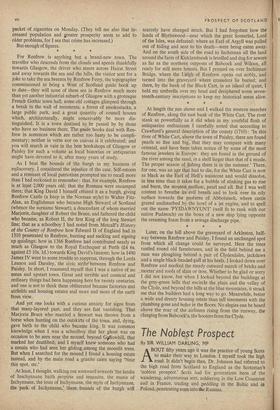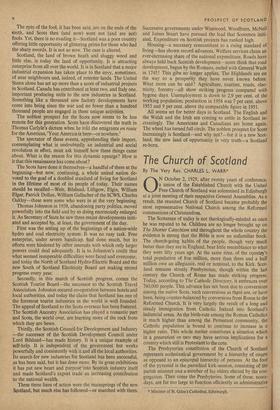The Noblest Prospect
By SIR WILLIAM DARLING, MP BOUT fifty years ago it was the practice of young Scots to make their way to London. I myself took the high road. It didn't begin then. Dr. Johnson had referred to the high road from Scotland to England as the Scotsman's 'noblest prospect.' Scots had for generations been of the wandering, adventurous sort, soldiering in the Low Countries and in France, trading and peddling in the Baltic and in Poland, penetrating even into the Russias. The eyes of the fool, it has been said, are on the ends of the earth. and Scots then (and now) were not (and are not) fools. Yet, there is no evading it—Scotland was a poor country offering little opportunity of glittering prizes for those who had the sharp swords. It is not so now. The case is altered.
Scotland, the land of brown heath and shaggy wood and little else, is today the land of opportunity. It is attracting enterprise from all over the world. It is in Scotland that a major industrial expansion has taken place to the envy, sometimes, of near neighbours and, indeed, of remoter lands. The United States alone has set up more than a score of industrial projects in Scotland. Canada has contributed at least two, and Italy one, important producing units to the new industries in Scotland. Something like a thousand new factory developments have come into being since the war and no fewer than a hundred thousand people are engaged in these unique activities.
The noblest prospect for the Scots now seems to be less remote for this generation. Scots have discovered the truth in Thomas Carlyle's dictum when he told the emigrants en route for the Americas, 'Your America is here—or nowhere.'
The spectator of these events, apprehending their import, contemplating what is undoubtedly an industrial and social revolution in effect, must ask himself how these things came about. What is the reason for this dynamic upsurge? How is it that this renaissance has come about?
The Scots have done it themselves—a handful of them at the beginning—but now, continuing, a whole united nation de- voted to the goal of a doubled standard of living for Scotland in the lifetime of most of its people of today. Their names should be recalled—Weir, Bilsland, Lithgow, Elgin, William Elgar, Patrick DoIlan, William Gallacher of the SCWS, Charles Oakley—these were some who were in at the very beginning.
Thomas Johnston in 1938, abandoning party politics, moved powerfully into the field and by so doing enormously enlarged it. As Secretary of State he saw three major developments initi- ated and accepted by, at least, the government of the day.
First was the setting up of the beginnings of a nation-wide hydro and coal electricity system. It was no easy task. Free enterprise, under severe handicap, had done much, but its efforts were hindered by other interests with which only larger powers could deal adequately. It is to Johnston's credit that what seemed insuperable difficulties were faced and overcome; and today the North of Scotland Hydro-Electric Board and the new South of Scotland Electricity Board are making record progress every year.
Secondly, in this march of Scottish progress. comes the Scottish Tourist Board—the successor to the Scottish Travel Association. Johnston secured co-operation between hotels and local authorities, and today the claim that Scotland has one of the foremost tourist industries in the world is well founded. The appeal of Scotland to the Scots overseas has been fostered. The Scottish Ancestry Association has played a romantic part and Scots, the world over, are learning more of the rock from which they are hewn.
Thirdly, the Scottish Council for Development and Industry —the successor of the Scottish Development Council under Lord Bilsland—has made history. It is a unique example of self-help. It is independent of the government but works powerfully and consistently with it and all the local authorities. Its search for new industries for Scotland has been successful, as has been said, but it has done more. By its great exhibitions it has put new heart and purpose into Scottish industry itself and made Scotland's export trade an increasing contribution to the national wealth. Successive governments under Westwood, Woodburn, McNeil and James Stuart have pursued the lead that Scotsmen initi- ated. Expenditure on Scottish projects has ranked high.
Housing—a necessary concomitant to a rising standard of living—has shown record advances. Welfare services claim an ever-increasing share of the national expenditure. Roads have always held back Scottish development—some think that road development, begun by the Romans, ended with General Wade in 1745! This gibe no longer applies. The Highlands are on the way to a prosperity they have never known before. What more can be said? Agriculture, tourism, roads, elec- tricity, forestry—all show striking progress compared with bygone days. Unemployment is down to 2.9 per cent. of the working population; production in 1954 was 7 per cent. above 1953 and 9 per cent. above the comparable figure in 1951.
All seems set for better days in Scotland. The English and the Welsh and the Irish are coming to settle in Scotland in- creasingly. The Americans and Canadians are home again. The wheel has turned full circle. The noblest prospect for Scots increasingly is Scotland—and why not?—for it is a new Scot- land, the new land of opportunity in very truth—a Scotland re-born.


















































 Previous page
Previous page